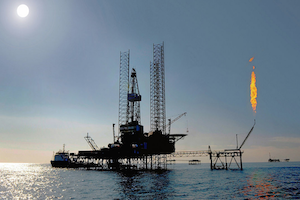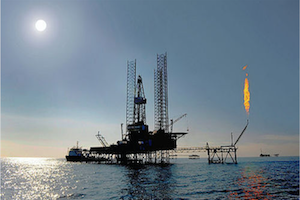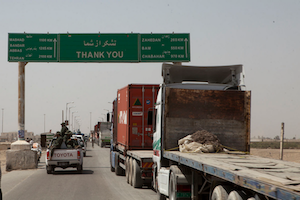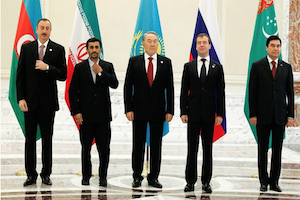Russia's Military Capabilities in the Caspian
By Nurlan Aliyev
February 21, 2019, the CACI Analyst
On December 5, 2018, Colonel-General Alexander Dvornikov, commander of the Southern Military District (SMD), stated that the basis of an inter-forces troop contingent including sea, air and coastal components has been established in Dagestan. According to Dvornikov, fighters of the 4th Army Air Force and the SMD’s Air Defense have been put on alert at one of Dagestan’s airfields. Strengthening its high precision strike capabilities in the Caspian, Russia also intends to improve its ability to block the Basin to outside actors in support of its strategies regarding the Caucasus, Central Asia and the Middle East. The Caspian holds immense strategic value to Russia, given its geographical proximity to the Black Sea and the Sea of Azov.

Thinking Big About Caspian Energy
By Stephen Blank
November 29, 2018, the CACI Analyst
The signing of the Caspian convention in August 2018 has opened up exciting new possibilities for getting Central Asian oil and gas to European and global markets. The long-desired Southern Gas Corridor (SGC) from both shores of the Caspian has thus become a possibility. By thinking big, we can use Caspian gas for beneficial economic and political purposes. Whatever route Caspian energy takes to Europe, it must traverse the Caucasus and can be of substantial value in transforming the Eurasian geopolitical scene and agenda. Specifically, those parties who have the most to gain form resolving the Nagorno-Karabakh conflict can now devise a peace program that incorporates the use of energy to help foster an enduring peace between Armenia and Azerbaijan, reduce Russia’s ability to manipulate this conflict, and at the same time enrich them both as well as European consumers.

The Perspective of Trans-Caspian Gas Flow to Europe
By Ilgar Gurbanov
October 25, 2018, the CACI Analyst
On August 12, Azerbaijan, Kazakhstan, Russia, Iran, and Turkmenistan signed the Convention on the Caspian Sea’s Legal Status in Astana. The Convention’s provision endorsing the construction of a subsea pipeline raised optimism regarding the Trans-Caspian Gas Pipeline (TCGP) project, which has been stalled due to the Caspian’s uncertain status. Discussions on the TCGP have been ongoing since the 1990s, envisaging the export of 30 billion cubic meters/year (bcm/y) of Turkmen gas to Europe across the Caspian by integrating with the Southern Gas Corridor (SGC).

Afghanistan-Iran Trade Corridors to Bear Fruit for Both India and China
By Tristan Kenderdine
July 17, 2018, the CACI Analyst
A strategic deployment of trade corridors is taking shape across Afghanistan and Iran as both India and China subvert each other’s trade strategies through key geoeconomic states. Afghanistan’s land corridor to Chabahar port connects it to India by sea, creating a Persian-Gulf to Caspian Sea corridor, while the Afghan air corridor to India provides a parallel, more direct trade route. By contrast, China’s twin economic corridors in the region run perpendicular: north-south through Pakistan to the Gulf, and east-west through Iran to Istanbul. Pakistan’s Gwadar and Iran’s Chabahar are thus effectively in the same geopolitical node, connecting very different Great Game trade strategies.

Is there an Agreement on Caspian Sea Delimitation?
By Stephen Blank
January 25, 2018, the CACI Analyst
On December 5, 2017, Russian Foreign Minister Sergei Lavrov announced that all the key issues regarding the delimitation of the Caspian Sea had been resolved and that a treaty was being prepared for heads of state to sign in 2018 in Astana. Yet less optimistic statements from the other parties, particularly Iran, suggest that Lavrov’s assessment was premature. If Russia and Iran can nevertheless reconcile their differences on the demarcation of the Caspian, this would have important strategic consequences not only for the littoral states, but also for the Caucasus, Central Asia and the Middle East.



